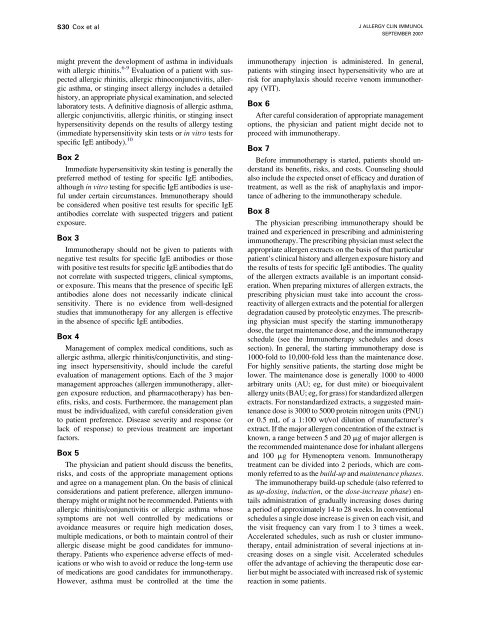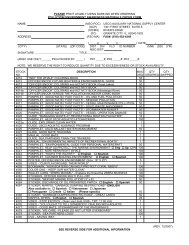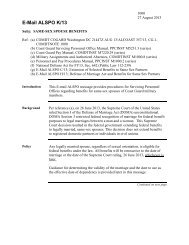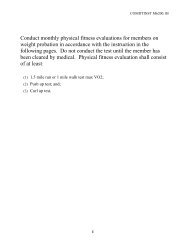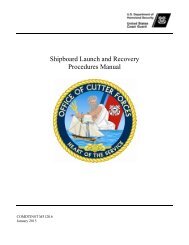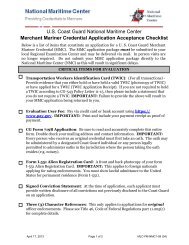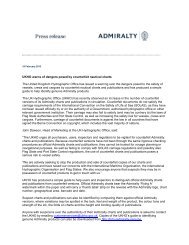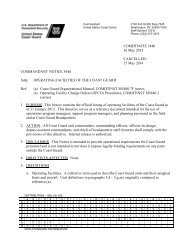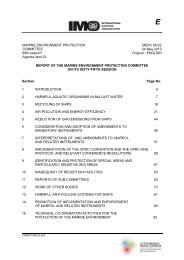Immunotherapy Safety for the Primary Care ... - U.S. Coast Guard
Immunotherapy Safety for the Primary Care ... - U.S. Coast Guard
Immunotherapy Safety for the Primary Care ... - U.S. Coast Guard
You also want an ePaper? Increase the reach of your titles
YUMPU automatically turns print PDFs into web optimized ePapers that Google loves.
S30 Cox et al<br />
J ALLERGY CLIN IMMUNOL<br />
SEPTEMBER 2007<br />
might prevent <strong>the</strong> development of asthma in individuals<br />
with allergic rhinitis. 6-9 Evaluation of a patient with suspected<br />
allergic rhinitis, allergic rhinoconjunctivitis, allergic<br />
asthma, or stinging insect allergy includes a detailed<br />
history, an appropriate physical examination, and selected<br />
laboratory tests. A definitive diagnosis of allergic asthma,<br />
allergic conjunctivitis, allergic rhinitis, or stinging insect<br />
hypersensitivity depends on <strong>the</strong> results of allergy testing<br />
(immediate hypersensitivity skin tests or in vitro tests <strong>for</strong><br />
specific IgE antibody). 10<br />
Box 2<br />
Immediate hypersensitivity skin testing is generally <strong>the</strong><br />
preferred method of testing <strong>for</strong> specific IgE antibodies,<br />
although in vitro testing <strong>for</strong> specific IgE antibodies is useful<br />
under certain circumstances. <strong>Immuno<strong>the</strong>rapy</strong> should<br />
be considered when positive test results <strong>for</strong> specific IgE<br />
antibodies correlate with suspected triggers and patient<br />
exposure.<br />
Box 3<br />
<strong>Immuno<strong>the</strong>rapy</strong> should not be given to patients with<br />
negative test results <strong>for</strong> specific IgE antibodies or those<br />
with positive test results <strong>for</strong> specific IgE antibodies that do<br />
not correlate with suspected triggers, clinical symptoms,<br />
or exposure. This means that <strong>the</strong> presence of specific IgE<br />
antibodies alone does not necessarily indicate clinical<br />
sensitivity. There is no evidence from well-designed<br />
studies that immuno<strong>the</strong>rapy <strong>for</strong> any allergen is effective<br />
in <strong>the</strong> absence of specific IgE antibodies.<br />
Box 4<br />
Management of complex medical conditions, such as<br />
allergic asthma, allergic rhinitis/conjunctivitis, and stinging<br />
insect hypersensitivity, should include <strong>the</strong> careful<br />
evaluation of management options. Each of <strong>the</strong> 3 major<br />
management approaches (allergen immuno<strong>the</strong>rapy, allergen<br />
exposure reduction, and pharmaco<strong>the</strong>rapy) has benefits,<br />
risks, and costs. Fur<strong>the</strong>rmore, <strong>the</strong> management plan<br />
must be individualized, with careful consideration given<br />
to patient preference. Disease severity and response (or<br />
lack of response) to previous treatment are important<br />
factors.<br />
Box 5<br />
The physician and patient should discuss <strong>the</strong> benefits,<br />
risks, and costs of <strong>the</strong> appropriate management options<br />
and agree on a management plan. On <strong>the</strong> basis of clinical<br />
considerations and patient preference, allergen immuno<strong>the</strong>rapy<br />
might or might not be recommended. Patients with<br />
allergic rhinitis/conjunctivitis or allergic asthma whose<br />
symptoms are not well controlled by medications or<br />
avoidance measures or require high medication doses,<br />
multiple medications, or both to maintain control of <strong>the</strong>ir<br />
allergic disease might be good candidates <strong>for</strong> immuno<strong>the</strong>rapy.<br />
Patients who experience adverse effects of medications<br />
or who wish to avoid or reduce <strong>the</strong> long-term use<br />
of medications are good candidates <strong>for</strong> immuno<strong>the</strong>rapy.<br />
However, asthma must be controlled at <strong>the</strong> time <strong>the</strong><br />
immuno<strong>the</strong>rapy injection is administered. In general,<br />
patients with stinging insect hypersensitivity who are at<br />
risk <strong>for</strong> anaphylaxis should receive venom immuno<strong>the</strong>rapy<br />
(VIT).<br />
Box 6<br />
After careful consideration of appropriate management<br />
options, <strong>the</strong> physician and patient might decide not to<br />
proceed with immuno<strong>the</strong>rapy.<br />
Box 7<br />
Be<strong>for</strong>e immuno<strong>the</strong>rapy is started, patients should understand<br />
its benefits, risks, and costs. Counseling should<br />
also include <strong>the</strong> expected onset of efficacy and duration of<br />
treatment, as well as <strong>the</strong> risk of anaphylaxis and importance<br />
of adhering to <strong>the</strong> immuno<strong>the</strong>rapy schedule.<br />
Box 8<br />
The physician prescribing immuno<strong>the</strong>rapy should be<br />
trained and experienced in prescribing and administering<br />
immuno<strong>the</strong>rapy. The prescribing physician must select <strong>the</strong><br />
appropriate allergen extracts on <strong>the</strong> basis of that particular<br />
patient’s clinical history and allergen exposure history and<br />
<strong>the</strong> results of tests <strong>for</strong> specific IgE antibodies. The quality<br />
of <strong>the</strong> allergen extracts available is an important consideration.<br />
When preparing mixtures of allergen extracts, <strong>the</strong><br />
prescribing physician must take into account <strong>the</strong> crossreactivity<br />
of allergen extracts and <strong>the</strong> potential <strong>for</strong> allergen<br />
degradation caused by proteolytic enzymes. The prescribing<br />
physician must specify <strong>the</strong> starting immuno<strong>the</strong>rapy<br />
dose, <strong>the</strong> target maintenance dose, and <strong>the</strong> immuno<strong>the</strong>rapy<br />
schedule (see <strong>the</strong> <strong>Immuno<strong>the</strong>rapy</strong> schedules and doses<br />
section). In general, <strong>the</strong> starting immuno<strong>the</strong>rapy dose is<br />
1000-fold to 10,000-fold less than <strong>the</strong> maintenance dose.<br />
For highly sensitive patients, <strong>the</strong> starting dose might be<br />
lower. The maintenance dose is generally 1000 to 4000<br />
arbitrary units (AU; eg, <strong>for</strong> dust mite) or bioequivalent<br />
allergy units (BAU; eg, <strong>for</strong> grass) <strong>for</strong> standardized allergen<br />
extracts. For nonstandardized extracts, a suggested maintenance<br />
dose is 3000 to 5000 protein nitrogen units (PNU)<br />
or 0.5 mL of a 1:100 wt/vol dilution of manufacturer’s<br />
extract. If <strong>the</strong> major allergen concentration of <strong>the</strong> extract is<br />
known, a range between 5 and 20 mg of major allergen is<br />
<strong>the</strong> recommended maintenance dose <strong>for</strong> inhalant allergens<br />
and 100 mg <strong>for</strong> Hymenoptera venom. <strong>Immuno<strong>the</strong>rapy</strong><br />
treatment can be divided into 2 periods, which are commonly<br />
referred to as <strong>the</strong> build-up and maintenance phases.<br />
The immuno<strong>the</strong>rapy build-up schedule (also referred to<br />
as up-dosing, induction, or <strong>the</strong> dose-increase phase) entails<br />
administration of gradually increasing doses during<br />
a period of approximately 14 to 28 weeks. In conventional<br />
schedules a single dose increase is given on each visit, and<br />
<strong>the</strong> visit frequency can vary from 1 to 3 times a week.<br />
Accelerated schedules, such as rush or cluster immuno<strong>the</strong>rapy,<br />
entail administration of several injections at increasing<br />
doses on a single visit. Accelerated schedules<br />
offer <strong>the</strong> advantage of achieving <strong>the</strong> <strong>the</strong>rapeutic dose earlier<br />
but might be associated with increased risk of systemic<br />
reaction in some patients.


